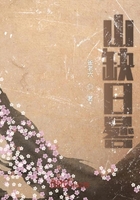LIGHT FROM THE MAN OF WAR.
In the early sunlight of the next day, we tossed close off the buoy and saw the city sparkle in its groves about the foot of the Punch-bowl, and the masts clustering thick in the small harbour. A good breeze, which had risen with the sea, carried us triumphantly through the intricacies of the passage; and we had soon brought up not far from the landing-stairs. I remember to have remarked an ugly horned reptile of a modern warship in the usual moorings across the port, but my mind was so profoundly plunged in melancholy that I paid no heed.
Indeed, I had little time at my disposal. Messieurs Sharpe and Fowler had left the night before in the persuasion that I was a liar of the first magnitude; the genial belief brought them aboard again with the earliest opportunity, proffering help to one who had proved how little he required it, and hospitality to so respectable a character. I had business to mind, I had some need both of assistance and diversion; I liked Fowler--I don't know why; and in short, I let them do with me as they desired.
No creditor intervening, I spent the first half of the day inquiring into the conditions of the tea and silk market under the auspices of Sharpe; lunched with him in a private apartment at the Hawaiian Hotel--for Sharpe was a teetotaler in public; and about four in the afternoon was delivered into the hands of Fowler. This gentleman owned a bungalow on the Waikiki beach; and there in company with certain young bloods of Honolulu, I was entertained to a sea-bathe, indiscriminate cocktails, a dinner, a hula-hula, and (to round off the night), poker and assorted liquors. To lose money in the small hours to pale, intoxicated youth, has always appeared to me a pleasure overrated. In my then frame of mind, I confess I found it even delightful; put up my money (or rather my creditors'), and put down Fowler's champagne with equal avidity and success; and awoke the next morning to a mild headache and the rather agreeable lees of the last night's excitement. The young bloods, many of whom were still far from sober, had taken the kitchen into their own hands, vice the Chinaman deposed; and since each was engaged upon a dish of his own, and none had the least scruple in demolishing his neighbour's handiwork, I became early convinced that many eggs would be broken and few omelets made. The discovery of a jug of milk and a crust of bread enabled me to stay my appetite; and since it was Sunday, when no business could be done, and the festivities were to be renewed that night in the abode of Fowler, it occurred to me to slip silently away and enjoy some air and solitude.
I turned seaward under the dead crater known as Diamond Head. My way was for some time under the shade of certain thickets of green, thorny trees, dotted with houses. Here I enjoyed some pictures of the native life: wide-eyed, naked children, mingled with pigs; a youth asleep under a tree; an old gentleman spelling through glasses his Hawaiian Bible; the somewhat embarrassing spectacle of a lady at her bath in a spring; and the glimpse of gaudy-coloured gowns in the deep shade of the houses. Thence I found a road along the beach itself, wading in sand, opposed and buffeted by the whole weight of the Trade: on one hand, the glittering and sounding surf, and the bay lively with many sails; on the other, precipitous, arid gullies and sheer cliffs, mounting towards the crater and the blue sky. For all the companionship of skimming vessels, the place struck me with a sense of solitude.
There came in my head what I had been told the day before at dinner, of a cavern above in the bowels of the volcano, a place only to be visited with the light of torches, a treasure-house of the bones of priests and warriors, and clamorous with the voice of an unseen river pouring seaward through the crannies of the mountain. At the thought, it was revealed to me suddenly, how the bungalows, and the Fowlers, and the bright busy town and crowding ships, were all children of yesterday; and for centuries before, the obscure life of the natives, with its glories and ambitions, its joys and crimes and agonies, had rolled unseen, like the mountain river, in that sea-girt place. Not Chaldea appeared more ancient, nor the Pyramids of Egypt more abstruse; and I heard time measured by "the drums and tramplings" of immemorial conquests, and saw myself the creature of an hour. Over the bankruptcy of Pinkerton and Dodd, of Montana Block, S. F., and the conscientious troubles of the junior partner, the spirit of eternity was seen to smile.
To this mood of philosophic sadness, my excesses of the night before no doubt contributed; for more things than virtue are at times their own reward: but I was greatly healed at least of my distresses. And while I was yet enjoying my abstracted humour, a turn of the beach brought me in view of the signal-station, with its watch-house and flag-staff, perched on the immediate margin of a cliff. The house was new and clean and bald, and stood naked to the Trades. The wind beat about it in loud squalls; the seaward windows rattled without mercy; the breach of the surf below contributed its increment of noise; and the fall of my foot in the narrow verandah passed unheard by those within.
There were two on whom I thus entered unexpectedly: the look-out man, with grizzled beard, keen seaman's eyes, and that brand on his countenance that comes of solitary living; and a visitor, an oldish, oratorical fellow, in the smart tropical array of the British man-o'-war's man, perched on a table, and smoking a cigar. I was made pleasantly welcome, and was soon listening with amusement to the sea-lawyer.















